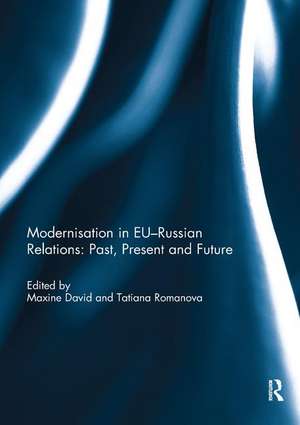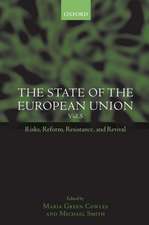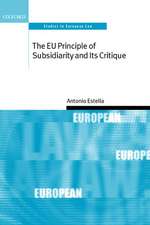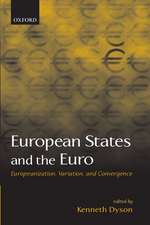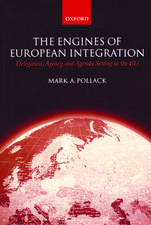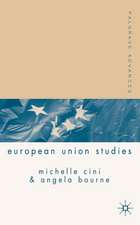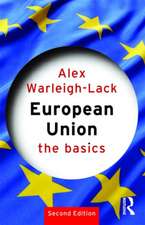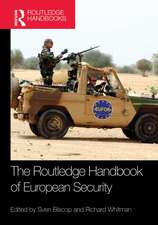Modernisation in EU-Russian Relations: Past, Present and Future
Editat de Maxine David, Tatiana Romanovaen Limba Engleză Paperback – 3 ian 2019
| Toate formatele și edițiile | Preț | Express |
|---|---|---|
| Paperback (1) | 408.54 lei 43-57 zile | |
| Taylor & Francis – 3 ian 2019 | 408.54 lei 43-57 zile | |
| Hardback (1) | 1163.66 lei 43-57 zile | |
| Taylor & Francis – 6 apr 2016 | 1163.66 lei 43-57 zile |
Preț: 408.54 lei
Nou
Puncte Express: 613
Preț estimativ în valută:
78.20€ • 84.97$ • 65.73£
78.20€ • 84.97$ • 65.73£
Carte tipărită la comandă
Livrare economică 21 aprilie-05 mai
Preluare comenzi: 021 569.72.76
Specificații
ISBN-13: 9781138391666
ISBN-10: 1138391662
Pagini: 158
Dimensiuni: 174 x 246 x 9 mm
Greutate: 0.27 kg
Ediția:1
Editura: Taylor & Francis
Colecția Routledge
Locul publicării:Oxford, United Kingdom
ISBN-10: 1138391662
Pagini: 158
Dimensiuni: 174 x 246 x 9 mm
Greutate: 0.27 kg
Ediția:1
Editura: Taylor & Francis
Colecția Routledge
Locul publicării:Oxford, United Kingdom
Public țintă
Postgraduate and UndergraduateCuprins
Chapter 1: Modernisation in EU-Russian Relations: Past, Present and Future Chapter 2: The Partnership for Modernisation: Contradictions of the Russian Modernisation Agenda Chapter 3: Economic Modernisation in Russia: The Role of the World Trade Organization Chapter 4: The Partnership for Modernisation through the Three Level-of-Analysis Perspectives Chapter 5: Can the Partnership for Modernisation Help Promote the EU-Russia Strategic Partnership? Chapter 6: The Modernisation Debate and Russian-German Normative Cleavages Chapter 7: New Social Media: Modernisation and Democratisation in Russia Chapter 8: The Russian Federation and European Union against Corruption: A Slight Misunderstanding? Chapter 9: The Modernisation Agenda in Russian Foreign Policy
Notă biografică
Maxine David is Lecturer in European Studies at the University of Surrey. She is a Foreign Policy analyst, specialising in the EU and Russia. She is one of the editors of and a contributing author to National Perspectives on Russia: European Foreign Policy in the Making? (Routledge; 2013). She has also published on gender and the European Neighbourhood Policy and is currently writing a monograph on Putin’s foreign policy through the lens of the agency-structure debate. Maxine is also Editor of the Journal of Contemporary European Research.
Tatiana Romanova is an associate professor at St Petersburg State University, she holds a Jean Monnet Chair and runs the Jean Monnet Centre of Excellence there. She was one of three editors for an edited collection on EU-Russian relations, bringing together Russian and Polish perspectives on various aspects of these relations (EU-Russian Relations; 2012)) and has authored multiple articles and book chapters on EU-Russian relations, including economic cooperation, legal approximation, modernisation, the energy dialogue and restrictive measures.
Tatiana Romanova is an associate professor at St Petersburg State University, she holds a Jean Monnet Chair and runs the Jean Monnet Centre of Excellence there. She was one of three editors for an edited collection on EU-Russian relations, bringing together Russian and Polish perspectives on various aspects of these relations (EU-Russian Relations; 2012)) and has authored multiple articles and book chapters on EU-Russian relations, including economic cooperation, legal approximation, modernisation, the energy dialogue and restrictive measures.
Descriere
In adapting themselves to the post-Cold War period, the EU and Russia have been faced with a range of challenges in relation to their separate political and economic development and their respective identities. Not the least problematic of those challenges, however, has been in deciding the nature and shape of their relationship with each other. In 2010, the Partnership for Modernisation was formed and it is this modernising agenda, as seen through theoretical, historical, economic and political perspectives, that is the focus of this book.
